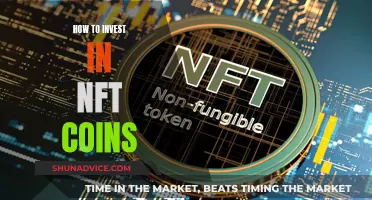
Blockchain technology is a digital public ledger that records transaction information. Each block of information is digitally verified, given a unique identity, and added to the public ledger. The technology reduces the risk of fraud, corruption, or data manipulation by a central authority. By linking verified data and making it accessible to everyone, blockchain also simplifies and automates previously inefficient processes. Given its potential, many investors are keen to explore opportunities in blockchain outside of crypto trading and individual stocks.
One way to invest in blockchain is through exchange-traded funds (ETFs). A blockchain ETF holds a basket of publicly traded companies exposed to the technology, either by directly using blockchain or by profiting from their services that support the industry. It's important to note that blockchain ETFs don't hold cryptocurrency assets directly. Instead, they invest in global companies, many of which are blue-chip technology names.
Another option is to invest in companies that are researching and developing blockchain products and services. These companies are creating blockchains for business or for in-house use. Examples include decentralised finance, financial technology, and metaverse-related ventures.
Before investing in blockchain, it's crucial to understand the technology, assess your risk tolerance, and conduct thorough research on the companies and funds involved.
| Characteristics | Values |
|---|---|
| Definition of blockchain | A digital public ledger that records transaction information. Each "block" of information is digitally verified, given a unique hash (or identity), and added to the public ledger. |
| How blockchain works with crypto | In the case of cryptocurrencies, adding a new block creates a new unit (or coin) of currency. |
| Use cases | Blockchain has potential uses in virtually every industry. For example, it can be used in healthcare to securely transfer patient medical records, in real estate to record transactions, or in lending to make loan processing faster. |
| Benefits of blockchain | Blockchain can help organisations become more efficient, reduce the risk of cyberattacks and fraud, and goes hand-in-hand with other technologies like cloud computing, e-commerce, and AI. |
| Risks of blockchain investments involving crypto | Many new cryptocurrencies don't pan out, and crypto prices can be highly volatile, leading to financial losses. |
| Ways to invest in blockchain | Invest in ETFs that focus on blockchain, buy stocks of companies using blockchain, or invest directly in cryptocurrencies or crypto exchange-traded funds (ETFs). |
| Examples of blockchain ETFs | Amplify Transformational Data Sharing ETF (BLOK), Siren Nasdaq NexGen Economy ETF (BLCN), First Trust Indxx Innovative Transaction & Process ETF (LEGR), Bitwise Crypto Industry Innovators (BITQ), and Global X Blockchain ETF (BKCH). |
| Examples of companies using blockchain | Walmart, PayPal, Visa, Mastercard, CME Group, Amazon, Microsoft, Alphabet, IBM, MicroStrategy, Coinbase Global, NVIDIA, JD.com, Micron Technology, Marathon Digital Holdings, CleanSpark, Riot Blockchain, and Hut 8 Mining. |
What You'll Learn
- Invest in blockchain ETFs like Amplify Transformational Data Sharing or Reality Shares Nasdaq
- Buy stocks of companies using blockchain, such as Walmart or PayPal
- Invest in companies developing blockchain products and services
- Invest in companies involved in blockchain technology, such as PayPal or Visa
- Buy an ETF that invests in shares of companies with exposure to blockchain

Invest in blockchain ETFs like Amplify Transformational Data Sharing or Reality Shares Nasdaq
Amplify Transformational Data Sharing ETF (BLOK)
The Amplify Transformational Data Sharing ETF offers investors an easy way to get exposure to companies that should theoretically prosper with the rise of blockchain and the adoption of blockchain-related technology. BLOK is an actively managed ETF that seeks to provide total return by investing at least 80% of its net assets in equity securities of companies actively involved in the development and utilization of blockchain technologies. BLOK does not invest directly in blockchain technology but invests in companies actively involved in the development and utilization of blockchain technology. BLOK is also comprised of companies that are partnering with and/or directly investing in companies that are actively engaged in this technology, as well as companies acting as members of multiple consortiums dedicated to this technology.
Reality Shares Nasdaq NexGen Economy ETF
The Reality Shares Nasdaq NexGen Economy ETF seeks long-term growth by tracking the investment returns, before fees and expenses, of the Reality Shares Nasdaq Blockchain Economy Index. The Index is designed to measure the returns of companies that are committing material resources to developing, researching, supporting, innovating or utilizing blockchain technology for their proprietary use or for use by others. These companies are committing material resources to further the use and deployment of blockchain technology to, for example, streamline the distribution and verification of cross-border payments; more efficiently store and secure cloud-based digital data; facilitate trusted transactions based on data security and privacy; and mitigate risk in supply chain management, among other uses.
Ravencoin: A Smart Investment Move?
You may want to see also

Buy stocks of companies using blockchain, such as Walmart or PayPal
Investing in blockchain stocks is a great way to gain exposure to the industry without directly investing in cryptocurrencies. Two notable companies that have implemented blockchain technology are Walmart and PayPal.
Walmart
Walmart has been a leader in supply chain management for years. However, like many other companies in the transportation industry, they faced challenges with data discrepancies in the invoice and payment process for freight carriers, resulting in costly reconciliation efforts and long payment delays. To address this issue, Walmart Canada built a blockchain network to automate the management of invoices and payments for its third-party freight carriers. This blockchain implementation has not only significantly reduced payment disputes but has also led to notable operational efficiencies.
Walmart has also collaborated with VeChain, a blockchain platform focused on improving food safety, to integrate blockchain technology into the retail food market. This partnership has resulted in over 200 million transactions, showcasing Walmart's commitment to regulatory compliance, sustainability, and enhanced traceability in the food industry.
PayPal
PayPal, a digital payments specialist, has fully embraced blockchain technology and cryptocurrencies. PayPal users can buy and sell crypto directly within their accounts. Additionally, the company is reportedly exploring the launch of its stablecoin, pegged to the US dollar, which would be a significant step toward integrating crypto with business. PayPal's current blockchain stock is US$79.75, with a 2.70% increase from the previous close.
PayPal has made strategic moves in the crypto space, such as allowing US-based users to buy Bitcoin and other cryptocurrencies directly from the app. While the company's SEC filings don't disclose the exact amount of crypto purchased by users, it has disclosed safeguarding billions of dollars in user crypto assets.
Investing in Blockchain Stocks
Investing in blockchain stocks, such as those of Walmart and PayPal, can offer several benefits. Firstly, it helps beginner investors diversify their portfolios beyond direct crypto investments. Secondly, it provides exposure to companies that are actively innovating and adopting blockchain technology, which has the potential to revolutionize various industries.
When considering investing in blockchain stocks, it is essential to remember that the performance of these stocks is often linked to the performance of cryptocurrencies. As crypto prices decline, related stocks may also struggle. Therefore, it is crucial to conduct thorough research, understand the risks, and consult with a financial professional before making any investment decisions.
A Guide to Buying Ripple with Coinbase
You may want to see also

Invest in companies developing blockchain products and services
There are several markets and industries you can choose to invest in when it comes to companies developing blockchain products and services.
Decentralized Finance (DeFi)
DeFi is the concept of removing financial institutions from their role as third parties in transactions. The idea is to allow people to take control of their finances with digital wallets, peer-to-peer lending, and other financial services. Cryptocurrency is part of DeFi, but it is only the tip of the iceberg.
Financial Technology (Fintech)
Fintech is the development and use of technology to improve existing financial services. Blockchain technology is revolutionizing traditional services like lending, money transfers, and banking. Examples of fintech companies include Paypal, Cash App, Galaxy Digital, and Block (formerly Square).
Web 3
Web 3 companies are developing solutions that are set to change how the internet works, with a focus on privacy, ownership, and control. Blockchain technology is being used to create an infrastructure that gives users more control over their personal information and online presence. Examples of companies in this space include Chainlink, Meta (formerly Facebook), Advanced Microdevices (AMD), Nvidia, Amazon, and Epic Games.
Supply Chain and Logistics
Blockchain technology can be used to improve supply chain and logistics operations, making it easier to track and trace shipments and boost safety precautions. An example of a company in this space is Chronicled, which leverages blockchain-enabled IoT devices to make the supply chain more transparent.
Healthcare
Blockchain has the potential to be used in healthcare to securely transfer patient medical records.
Real Estate
Blockchain can be used in real estate to record transactions.
Lending
Blockchain can make loan processing faster.
Cybersecurity
Blockchain can help reduce the risk of cyberattacks and fraud.
Artificial Intelligence (AI)
AI and blockchain can be combined to create more efficient and secure systems. For example, Lemonade combines AI and blockchain to help users receive renters and homeowners insurance at reasonable rates.
Retail
Retail companies can use blockchain to create rewards and loyalty programs.
Copyright Protection
Blockchain has applications in copyright protection.
Automotive
Automotive companies can use blockchain to track whether environmental or human rights violations have occurred in the supply chain. An example of a company in this space is Ford, which is also researching a blockchain system where drivers can transfer cryptocurrency to each other.
Government
Blockchain can be used to improve government processes.
The Right Time to Invest in Bitcoin?
You may want to see also

Invest in companies involved in blockchain technology, such as PayPal or Visa
Investing in blockchain technology, rather than in cryptocurrencies, can be done by purchasing stocks in companies that use blockchain technology. Some examples of such companies include PayPal, Visa, Walmart, and Square's Cash App. These companies are incorporating blockchain technology into their operations, and investing in them can provide exposure to the potential benefits of blockchain without directly investing in cryptocurrencies.
PayPal Holdings (PYPL), for instance, allows most U.S. customers to use several types of cryptocurrencies for transactions. It has also invested in Blockchain Capital's $300 million fund, which focuses on blockchain companies and has participated in its strategic partnership program. PayPal's general manager of blockchain, crypto, and digital currencies, Jose Fernandez da Ponte, has affirmed the company's commitment to "fostering an ecosystem of companies making digital currencies more accessible, useful, and secure."
Visa (V) is another company that has been an early supporter of blockchain and crypto payments. It has invested in Blockchain Capital's fund and has a partnership with Anchorage, a portfolio company that provides custody services. Vasant Prabhu, CRO of Visa Inc., stated that the company is "focused on enhancing all forms of money movement" and that their relationship with Blockchain Capital deepens their involvement in shaping the role of digital currencies.
Walmart (WMT) is exploring the use of blockchain to track food distribution from its suppliers, potentially improving food safety.
Square's Cash App digital wallet (SQ) allows users to buy and sell bitcoin.
By investing in these companies, you can gain exposure to blockchain technology and its potential benefits without directly investing in cryptocurrencies. It is essential to consider the risks and conduct thorough research before making any investment decisions.
Ecoin Invest Company: What's the Deal?
You may want to see also

Buy an ETF that invests in shares of companies with exposure to blockchain
An ETF, or exchange-traded fund, is a type of investment fund that holds a collection of stocks or other assets and can be traded on an exchange. Blockchain ETFs specifically hold stocks of companies that profit from or have business operations tied to blockchain technology. These companies may have cryptocurrency on their balance sheets or engage with blockchain technology in other parts of their business.
- Amplify Transformational Data Sharing ETF (BLOK): This actively managed ETF selects global companies that develop and apply blockchain technologies. Its top holdings include MicroStrategy Inc (MSTR) and Coinbase Global (COIN).
- Siren Nasdaq NexGen Economy ETF (BLCN): BLCN owns global companies supporting the development and research of blockchain technology. Its top holdings include MicroStrategy (MSTR) and Coinbase Global (COIN).
- Bitwise Crypto Industry Innovators ETF (BITQ): This passively managed ETF tracks an index of 30 crypto companies from around the world, with many deriving more than 75% of their revenues from crypto assets.
- Global X Blockchain ETF (BKCH): BKCH invests in global companies participating in blockchain activities like digital asset mining and integration. Its top holdings include CleanSpark (CLSK) and Coinbase Global (COIN).
When investing in blockchain ETFs, it is important to note that these funds generally do not hold cryptocurrency assets directly. Additionally, blockchain ETFs carry the inherent risk of non-performance or failure of the blockchain ecosystem. The holdings of these ETFs may also overlap with existing technology and internet companies, and the expense ratios can be higher compared to other types of ETFs.
Best Platforms to Invest in Bitcoin: Your Ultimate Guide
You may want to see also
Frequently asked questions
Blockchain ETFs hold a basket of publicly traded companies exposed to blockchain technology. Examples include Amplify Transformational Data Sharing ETF (BLOK), Siren Nasdaq NexGen Economy ETF (BLCN), and First Trust Indxx Innovative Transaction & Process ETF (LEGR).
Similar to other thematic investments such as electric vehicles or artificial intelligence, blockchain investments tend to come with additional sources of volatility. These risks can be market-related, such as pricing valuations, or sudden changes in investors' sentiment. There are also macro risks, such as additional government regulation, which could impact the value of blockchain-related investments.
You can gain exposure to blockchain technology by investing in companies that are researching, developing, and applying blockchain technologies. Examples include MicroStrategy Inc (MSTR), Coinbase Global (COIN), and Riot Blockchain (RIOT). You can also invest in companies that are using blockchain technology, such as Walmart or PayPal.
Blockchain is a digital public ledger that records transaction information. Each "block" of information is digitally verified, given a unique hash (or identity), and added to the public ledger. Blockchain technology reduces the risk of fraud, corruption, or data tampering by a central authority, as it democratizes access to information on an open ledger that everyone can see.







